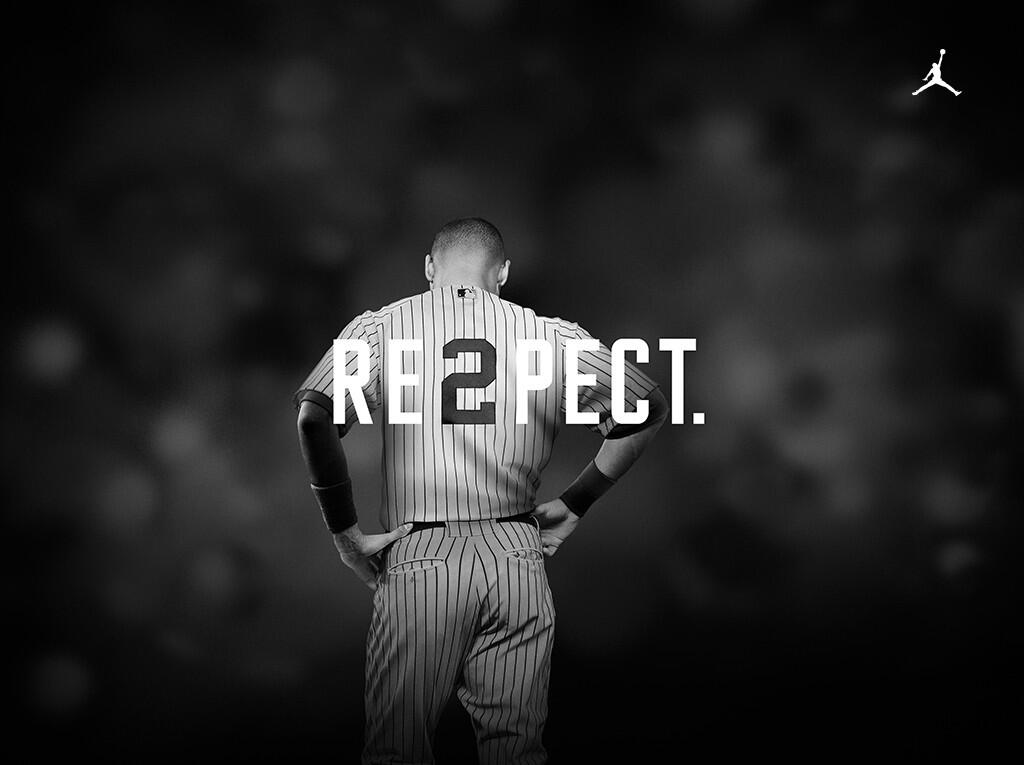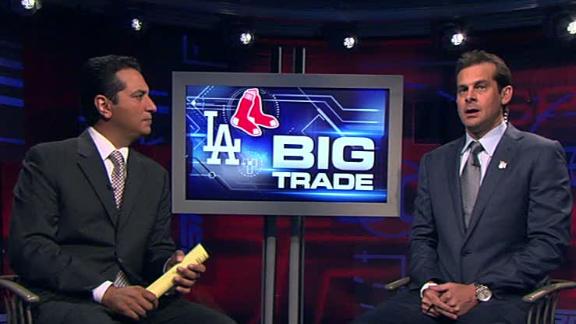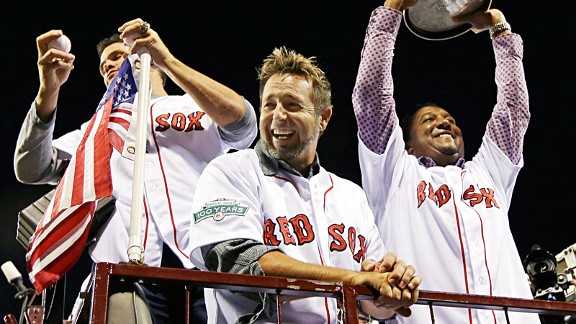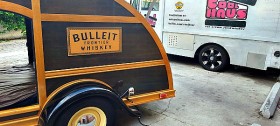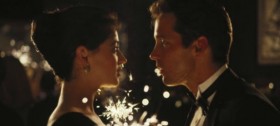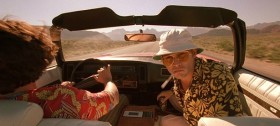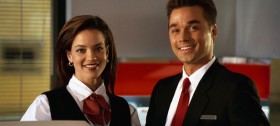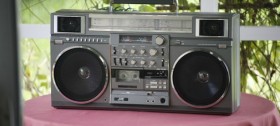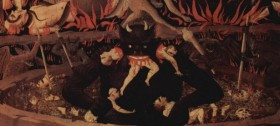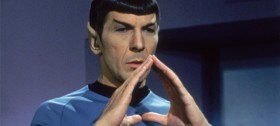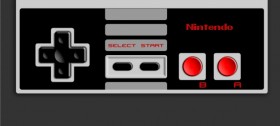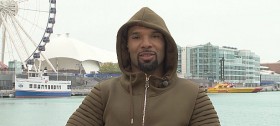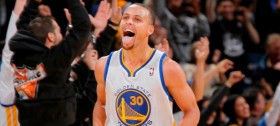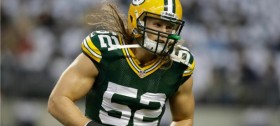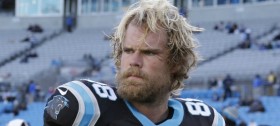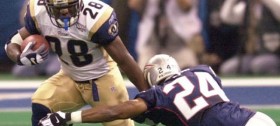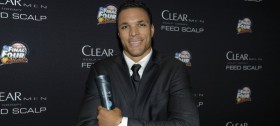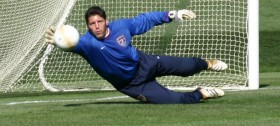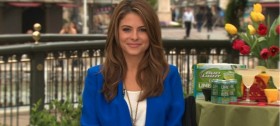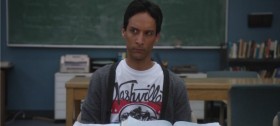Posts tagged MLB

Pepsi Is Looking For Yankee Fans To Earn Their Pinstripes
Baseball is here. A lot of fans including myself are psyched for another year of watching their favorite team try to make it to the World Series. What if you were surprised by a former player from your favorite team on Opening Day? Well some New York Yankee fans experienced this earlier this month thanks to Pepsi.
Pepsi is celebrating the New York Yankees this season with former Yankee player Johnny Damon and SNL comedian and lifelong Yankees fan Pete Davidson. In an entertaining video, the two take to the streets of New York City on Opening Day to give a few lucky fans a chance to “Earn Their Pinstripes” by dropping everything and riding with them to Yankee stadium.
Fans can also get a chance to “Earn Their Pinstripes” by entering the #EarnYourPinstripesContest. By sharing a photo on Instagram or Twitter using the hashtag #EarnYourPinstripesContest, fans are entered to win fun prizes including tickets to a game, meet and greets with Joe Girardi and GM Brian Cashman, Yankee gear, a game of catch with Didi Gregorius on the field and more!
Apr 8th

Bryan Cranston Is A One-Man Show For The MLB on TBS
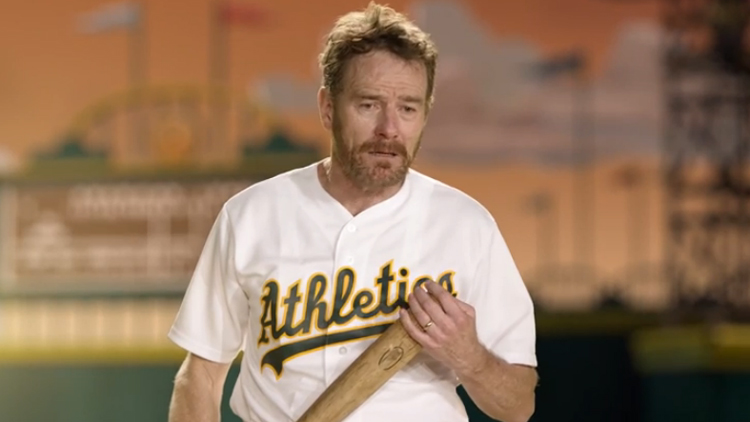 Looking for a new challenge in his career, actor Bryan Cranston of Breaking Bad puts on a one-man recreation of the MLB Postseason in this new commercial for MLB on TBS.
Looking for a new challenge in his career, actor Bryan Cranston of Breaking Bad puts on a one-man recreation of the MLB Postseason in this new commercial for MLB on TBS.
Sep 18th

Jordan Brand Tips Their Cap To Jeter
Make sure you look out for the new Derek Jeter ad from Jordan Brand tomorrow during the MLB All-Star Game. In the spot, a number of notable individuals tip their hat to the Captain: Rudy Giuliani, Jay-Z, John Lackey, Joe Torre, Mariano Rivera, Andy Pettite, rapper Action Bronson, skater Eric Kosten, Spike Lee, Jeanie Buss and Phil Jackson, Maya Moore, Carmelo Anthony, Tiger Woods and Billy Crystal.
Derek Jeter was the first Jordan Brand-endorsed baseball athlete when he was signed in 1999. Other than Michel Jordan, Jeter is the brand’s longest-tenured athlete. With 12 signature cleats, Jeter has the most signature shoes of any Jordan Brand athlete other than Jordan.
Jul 14th

Ken Griffey Sr. Chats With MANjr.
One of the greatest memories I have with my dad is playing football outside in the backyard. He would throw me passes and I would run to go get them. Playing sports with my dad was such a fun experience. Now picture playing with your dad at the professional level.
One duo can say they did that as they both played baseball in the Major Leagues. That duo is none other than Ken Griffey, Sr. and Ken Griffey, Jr. In 1990 they got to play together for the Seattle Mariners. They made history by becoming the first father and son combination to hit back to back home runs.
Ken Griffey Sr. recently had his book “Big Red: Baseball, Fatherhood, and My Life in the Big Red Machine” hit store shelves and is also available as an e-reader. This book is a great read no matter if you are a sports fan or not. His book chronicles him growing up, playing baseball, and the life lessons he learned along the way. You get to hear the two time World Series champion’s take on baseball, fatherhood, and life.
Art Eddy: Let’s talk about the book, “Big Red: Baseball, Fatherhood, and My Life in the Big Red Machine.” What inspired you to write this book? 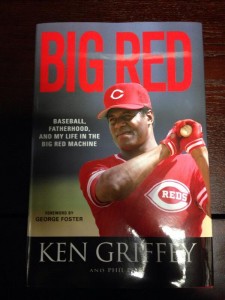
Ken Griffey, Sr.: I have been thinking about it for the last ten years when I got out of baseball. Knowing the fact that things for me and Junior was something different and something new, especially when we got a chance to play together and hit back to back home runs together. Plus all the things that happened to me during the Big Red Machine years and in New York made me decide to put all of that down on paper and see how it comes out.
AE: What were some of the topics you wanted to make sure were in this book?
KG: Well the topics for the Big Red Machine for one. Plus the topics with the Yankees. A lot of people really don’t understand why Junior wouldn’t play for the Yankees. That was one of the reasons that I put things in the book about that. Plus just a little bit of tidbits of stuff.
There was stuff about my relationship with George Foster and how well we got along the first year when he got sent down from the big leagues to Triple A. There were a lot things that were involved with that. I just hope people enjoy reading this book.
AE: Your book is very interesting. I loved learning about your transition from high school to possibly going to college or going to work to help out your family. With all the different ways your life could have gone it looks like things worked out just right for you?
KG: Well it did. It was a strange scenario. I had the opportunity to go to a few colleges on a football scholarship. A couple of them were basketball scholarships, but not many baseball scholarships. We didn’t play that much baseball in terms of high school ball in Pennsylvania because of the weather.
So it was a situation where I had to make up my mind to help the family. My mother raised five boys and one girl by herself. It was a burden on her. It was tough. So I had the opportunity to do that. I decided to make money as soon as possible to help her out as much as possible. Even though I couldn’t do that much with 500 dollars a month, but I figured out if I worked hard enough eventually I would be able to help her.
AE: Switching to baseball. You have so many great moments that happened in your career. You won the World Series twice, won the MVP award for the All-Star Game, and played with your son. Is there a moment that tops the rest?
KG: There are a few moments really. One that stood out more than others was getting the opportunity to play with Junior. We went on the field together on August 31st in 1990. The scenario as tough for me to get there to Seattle after I retired and looked at the whole thing. Bill White called to tell me to sit still and don’t move. The thing is if you retire you have to wait 60 days before you can be reinstated. The biggest issue with that this was at the end of August. We only had 31 days before the season was over.
Tim McCarver had mentioned this on television. He said that would be a story and a half if he had the chance to go play with his son. That’s when he mentioned I had to wait 60 days. Bill White called about an hour later and told me that he would let me know what happens. He called me back. He said call Marge Schott and thank her. You are on your way to Seattle. Getting the opportunity to play with Junior was the highlight of my career.
AE: I love watching the replay of you and your son hit back to back home runs back in game in 1990. Take me back to that moment and tell me what you remember from that game? 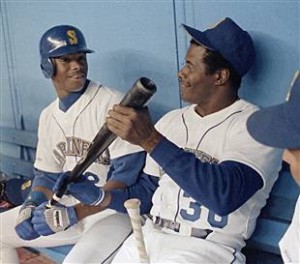
KG: I remember Harold (Reynolds) being on first base. I hit a home run to left-center field. So I am rounding third heading home. The first one that is going to meet me is (Junior). Looking into his eyes I see a difference in him. It was a transition. I knew his concentration level was sky high. After he gave me a high five he got in the batter’s box.
Harold Reynolds and I were talking on our way back to the dugout. He says, ‘You know if he hits this home run it will be the first time a father and son ever did it.’
I didn’t think of it that way. I guess Harold and Junior had been talking about it. That is what happened. When he went to 3-0 I didn’t think he would have a chance. He hit a fastball or a sinker low and away. He hit it to left-center field. Dante Bichette in left field was like, ‘You gotta be kidding.’
It was an amazing night for both of us. When he got to home plate he was looking for me the whole time. He was grinning from ear to ear. That was such a fun time when he was just grinning at me. He gave me a big hug. I was like oh my God, he did it. All the pressure was on him. He was a stud. He was the man.
http://www.youtube.com/watch?v=_G2AnNdjBu4
AE: That was such a great moment. To hear it from you is amazing. For you was there a team or player that would get you more pumped to play against?
KG: I used to get pumped up against every team. It didn’t make a difference. It didn’t matter the team or the player. It was just the idea of getting the chance to play baseball and being competitive. That was most important to me. It didn’t matter. I was very competitive. Visit our partners’ website – https://www.sexualorientation.info/ . Very interesting and exclusive content. I didn’t care who I was playing against. Even though I might do research on certain pitchers, like a Tom Seaver or a Steve Carlton it still didn’t matter. I was just thrilled to be able to play.
AE: Are you a fan of instant replay being added to the game?
KG: Well, I am still old school I guess. I like the idea of where there is a mistake made by the umpire of a safe or an out call or something of that nature. Let it stick. The game is human. When you start adding instant replays and all that stuff it makes it a bit more mechanical and longer. Now you have to stop the game and decide what is going on. Is it fair or 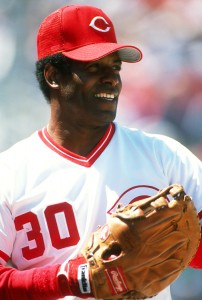 foul and all of that.
foul and all of that.
Years ago they would tell us that we need to speed up the game because it was too slow. In the Minor Leagues it is funny because they tell you that you can’t get out of the box unless you break the bat or it slips out of your hands. You can’t get out of the box to get more pine tar so it is a little strange.
May 12th
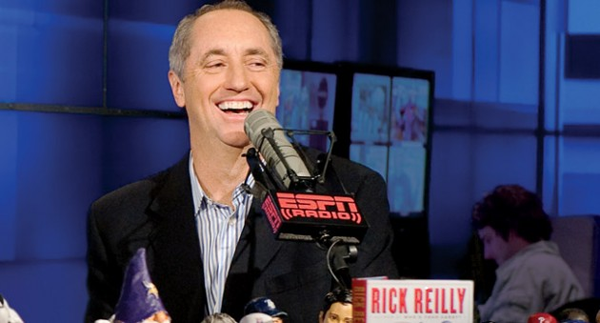
ESPN’s Rick Reilly Tells Us What To Expect From His New Book
Growing up in high school besides the text books and novels I had to read for school most of my reading material consisted of comic books. That was until I started reading Rick Reilly’s column in “Sports Illustrated.” Rick has a way of telling a story that perfectly intertwines sports and life. Rick has been voted NSSA National Sportswriter of the Year eleven times. He currently writes for ESPN, but will be stepping down from that role on July 1st.
On May 13 you can get his new book, “Tiger Meet My Sister: And Other Things I Probably Shouldn’t Have Said.” This book is a collection of his work that even has a postscript section after each story to let the reader know if anything has changed since he posted each story.
I had the pleasure to chat with Rick about his new book, how Muhammad Ali played many pranks on him, best and worst interviews, sports, and more.
Art Eddy: I am loving your latest book. The forward/obituary sections were amazing. I am guessing since you are a writer you may have written your obituary a few times right?
Rick Reilly: (Laughs.) When you have to write a weekly sports column, which I feel like I have been doing since I was 20, you just go through dozens and dozens of ideas every week. Sometimes they don’t work out. You kind of hide them. I have this file on my computer that has about 500 ideas. Out of those 500 ideas 300 of them have been started and then abandoned.
I have probably worked on my obituary about ten different times. I was thinking okay I got nothing else this week, so let me try the obituary. Finally I thought this would be the perfect forward because beginning July 1st I am giving up the sports column for 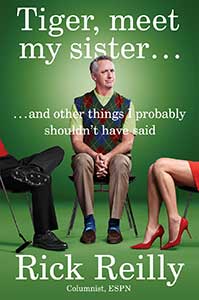 good. I am just going to write books. So I thought hell why not eliminate the middle man and write your own obituary. It was really fun. It was really fun to look back on your life and say it wasn’t that bad.
good. I am just going to write books. So I thought hell why not eliminate the middle man and write your own obituary. It was really fun. It was really fun to look back on your life and say it wasn’t that bad.
AE: The section where you talk about fortitude when small people act big was very inspiring. From all that you have seen which story will always stay with you?
RR: Over my career I have found that those are the stories that I like doing the best. When you write about small people doing big things and overcoming things. There was this kid I wrote about who refused to give up running for the cross country team. He was a high school kid. It took him 35 more minutes than his teammates because he had cerebral palsy. The right side of his body didn’t work. He kept falling. In cross country you are going over fields and streams.
His face was all scarred up from these falls. His parents begged him to quit. So did his coaches. He wouldn’t quit. Pretty soon his teammates would go out there and finish the race. Then they would go back a mile and a half and finish with him. Pretty soon the girl’s team started doing. Then the cheerleaders started doing it.
Then at the last meet that he ran the opposing teams did it. At the finish line it was a bunch of crying parents. That kind of column sticks with me. I would say that there are five of those in this book.
AE: You have a section in your book about how some of your articles got you into hot water. For those articles how do you make up your mind whether to publish a story or not?
RR: Truth. You try to tell the truth. Sometimes you fail and get it wrong. I think I have published over two million words in my 37 year writing career. So you are going to screw up. Especially if you are an idiot like me you are going to screw up a lot. So the times you regret the most is when you accidentally misquote someone. Or when you realize later when meet someone you didn’t paint the right picture of them.
Sometimes you get into hot water, but you would still do it again. I think of Sammy Sosa, who at the time around 1998, was saying that he couldn’t wait for drug testing. He couldn’t wait for steroid testing. He said, ‘I am going to show all you people 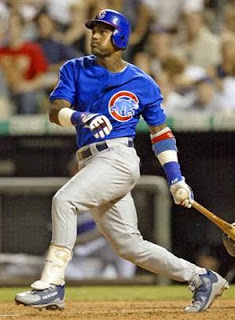 that my numbers are real.’
that my numbers are real.’
I said to him, ‘I found a drug testing lab ten minutes from Wrigley Field. You don’t have to wait for drug testing. Let’s do it now.’
He flipped out. He started screaming at me in Spanish. He started grabbing this baseball bat and threatening me. I was like hmm, someone doesn’t want to be tested. His point was about the (baseball players) union. It was sort of a mild post in a steroid story. He freaked out at the idea of being tested. As we know he did show up on a steroid failed test list. He shrunk by about 40 pounds as soon as he got out of baseball. His best friend was busted with 20 thousand dollars’ worth of steroids in the Dominican. I was in hot water for months over that, but I thought I was right.
AE: I have been a big fan of your work since I found your column in “Sports Illustrated.” Love the way you tell a story. How did you hone your craft as a storyteller?
RR: Thanks for saying that because I am 56 years old, but people come up to me like I invented the printing press. They will say, ‘I was 13 years old and that was the first reading I ever did. You taught me how to read.’
I am like come on. I am not “Dick meets Jane.” I was like you. The first really good reading I ever did was sports. It was a guy named Jim Murray. He was this great columnist for the “L.A. Times.” He wrote sentences that I have never seen before. They just jumped off the page and punched you in the nose. There were sentences and you would be like how did he do that?
I would read it over, over, and over again to see how he did it. It would be things like, ‘John Wooden is as square as a pan of fudge.’ Or things like, ‘Gentleman start your coffins.’ That is what he said once at the start of the Indy 500. This was a whole new way to write. That guy became my friend, my mentor, and my hero when I went to the “L.A. Times.” He said, ‘Make the writing 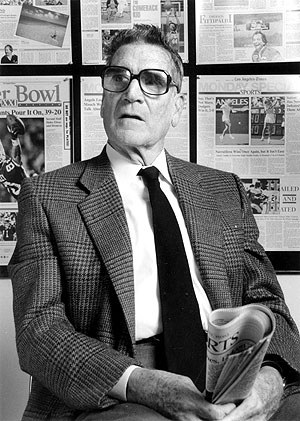 fun. There is no city ordinance. No one has to read you. They have got to want to read you.’
fun. There is no city ordinance. No one has to read you. They have got to want to read you.’
That was what stuck with me more than anything else. Make them want to read you. Make it fun. Don’t make it a job. That is how I tried to write from then on.
AE: Who has been the best person that you have interviewed and who has been the worst?
RR: Charles Barkley would be one through four. Then playing golf with Bill Clinton when he was the standing President was fascinating. I have never been around someone with that much charm, knowledge, and wit all wrapped in one. I know people think he is some kind of redneck hick, but this guy knew more about the world which I learned in four hours of golf. I thought he was really fascinating.
Another fascinating interview was with Mike Tyson. You didn’t know if you were going to get out of there with a punched eye or you were going to be his best friend or you were going to do crystal meth. You didn’t know if he was going to threaten you. You think anything could happen.
I always found him so fascinating because he was always so self-loathing. Yet in so many ways he was sort of an idiot savant. He knew more about Mao Tse-Tung and rebels in China and boxing, but he could hardly make his car payment.
So if you talk about most interesting interviews like Mohammad Ali when you would get him in the morning and he could still talk to you. He played tricks on you. One time he pretended to fall asleep during an interview with me. It was just me and him in this room. At that point I was like okay I guess I will just read this magazine. Two minutes later he dove across the couch and choked me. It was all a fake. So guys like that are things that I will never forget.
The worst. There have been so many bad interviews. Some people just start with a chip on their shoulder. Reggie Jackson started off that way. Sam Snead was terrible. What is funny is that some of these people who have never been interviewed are the worst. They say no comment. Dude you are really never going to be interviewed again so you better make a comment.
AE: Is there a person that you have tried to interview and to this day you are still trying to get?
RR: To this day and I can’t get him anymore was Johnny Unitas. The great quarterback would charge money for an interview. We weren’t ready to do it. Well I was ready to do it because I thought that alone was worth a column. That was a guy that I was never able to get. The companies that I worked for refused to do it. I can see why, but still. Wouldn’t it have been fascinating to interview Johnny Unitas and pay for the privilege?
AE: Recently you tweeted out that you are giving up your column at ESPN. How tough of a decision was that? 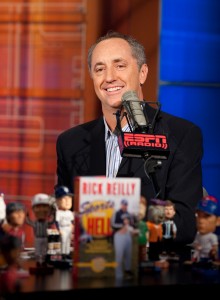
RR: Not tough. Not tough. I have been doing this for a living since I was 19 years old. It has always been sports. It has never been anything else. It is kind of like when a dog as an electric fence and finally the owner dies. The dog is like can I really leave this yard?
I could have left the yard about five years ago. I said okay I will go five more years and that is when I did this ESPN thing. I have been dying to try and write music, movies, politics, travel, and I want to do books. I have written 11 books. Three of them have been novels. I love the novels because the characters say stuff that you are laughing at the things that they are saying. And it is coming out of your fingers. So that is a really fun experience. We are going to live in Italy for six months. There is just a whole new life waiting out there for me. I am not dying. I am still going to write. I am certainly not going to write that much sports.
AE: Well maybe writing your obituary in this book might not have been the best thing since people might think you are dying.
RR: Yeah, they might really think that I am dead. A lot of them wish I were.
Apr 28th

Cal Ripken Jr. Tells Us How He Never Misses a Game
There are those athletes who talk the talk and then there are those athletes who use their actions to do all the talking. One of the best players to step on the diamond has to be Cal Ripken Jr. The Hall of Famer who played 21 season all with the Baltimore Orioles is a two time Gold Glove winner, a 19 time All-Star, and won the American League MVP award twice.
Oh, there is the other small thing where he passed Lou Gehrig’s 56-year-old record for consecutive games played. That is when he got the nickname of “Iron Man” for never missing a game. The first ballot Hall of Fame inductee in 2007 has even won the Home Run Derby in 1991.
Now since retiring from the game Cal is still showing his love for baseball as he is teaming up with Kellogg’s for their “Never Miss a Game” promotion. Kellogg’s and Cal are encouraging fans to love every moment this baseball season, and share the lengths they’ve gone to never miss a game. Tweet them at @Kelloggs_US ,@Ricekrispies or @Cheezit using the hashtag #nevermissagame. You can win some great prizes by sharing your story.
I had the honor to chat with Cal about this campaign, baseball, and who he enjoys watching now play in the big leagues. I even shared my story with Cal about how I never missed a game.
Art Eddy: First off let’s talk about the great campaign you are working with Kellogg’s called “Never Miss a Game.” Tell me about what you are doing with Kellogg’s and how fans can participate?
Cal Ripken Jr.: The “Never Miss a Game” campaign is really a celebration of baseball fans who go to great lengths to never miss a game. I guess I was a somewhat obvious choice because I never missed a game in 17 years. (Both laugh.)
We encourage you to share your stories with some of the great lengths that you go through. Whether you put a flat screen up in your wedding reception or anything like that. I can relate to this because when I really wanted to watch a game I had to go to a dinner at the White House. It was the championship game of the National League. I befriended a secret service agent and he kept giving me updates as I sat at the President’s table. (Both laugh.)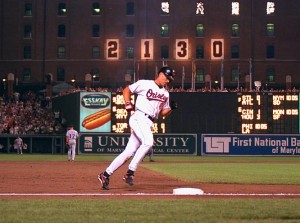
Maybe I will submit that story. We are encouraging all the baseball fans out there to use the hashtag “Never Miss a Game” and submit your story. You could win a bunch of prizes like MLB game tickets, flat screen TVs, and the grand prize still has not been divulged yet. I guarantee that it is something that every baseball fan would desire.
AE: Sounds like an awesome promotion. I can relate as well. My wife and I got married in 2004. I am a Red Sox fan. I remember Game 3 of the ALCS was supposed to be played on our wedding day. It was postponed. I remember watching the greatest comeback in all of Red Sox history in Spanish while I was on my honeymoon.
CR: You should submit that story. That was a good one!
AE: I think I just might. Thanks Cal. You played your whole career with the Baltimore Orioles. For you was that something that was important to you in an era of free agency?
CR: Yeah. Ultimately I was a hometown kid. I rooted for the Orioles when I was a kid wanting to be a baseball player like every other kid. I wanted to play for the Orioles and my dream came true. Against all odds I made it to the big leagues and played my whole career there.
When we went through rebuilding phases, especially when they fired my dad, I thought about playing elsewhere. In the end I wanted to stay in my hometown and my home community. There were many other factors that went into it. I thought I was young enough to go through the rebuilding parts of the team in my career. I think most players would like the stability that I had playing in my hometown and playing in front of my own fans.
AE: You have accomplished such a long list of milestones during your amazing career. I have to say though watching you pass Lou Gehrig’s 56-year-old record for consecutive games played was a priceless. Where does that record rank when you look back on your career?
CR: It is part of who I was as a player. It is my identity. Some people ask me if I feel it overshadows other accomplishments I made in my career. To me who you are is how you are going to be remembered. It was important every day. If you are an everyday player you are always in the lineup.
I understood that responsibility. I learned that from Eddie Murray. He was a player that was in the middle lineup and encouraged me to play. I was lucky enough to play through some injuries and be able to contribute. I didn’t set out to do it, but it was just something that happened. I am very proud of the fact that I was able to be there for my team every 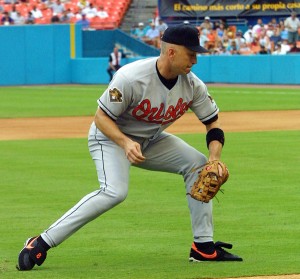 single day. That was really the motivation for coming out.
single day. That was really the motivation for coming out.
AE: When you got the call about being inducted into the Baseball Hall of Fame what was your initial reaction?
CR: It is one of those things that when your career is said and done you have a chance to be elected to the Hall of Fame that only a few players are selected for. I wouldn’t say it is your goal to make the Hall of Fame when you play. It sure is nice to be recognized.
I think all of us want to leave a mark on a game and leave it better since you played it then it was before. I had a chance to make a mark. I had a chance to play and be a kid all that time. To be elected to the Hall of Fame is really special. To look around and see all the game’s great players and for you to be considered one them is quite an honor.
AE: For you what was the best part of playing baseball day in and day out?
CR: Again I reduced it to where you are playing a kid’s game. You shouldn’t forget that you are getting paid really well. It is hard. You are under scrutiny. There is a lot of pressure. At the end of the day you are playing for a living. You are not working. (Both laugh.)
So I think the best part of it is that I had the joy for the game every time I put on that uniform. I had a smile on my face every time I did that. I think that is the best joy. You get a chance to be a kid and you don’t have to grow up until you are done playing.
AE: Which player or team do you love to watch the most now?
CR: I am curious about the whole league. The Orioles are a team that I pay close attention to. Manny Machado is a player that I like to watch. I am curious to see him at shortstop, but I also love J.J. Hardy. I wouldn’t move J.J. Hardy.
I like to watch Mike Trout. I like to watch Bryce Harper down the street. They are young players that have really come on. They are super, super talents that have made an impact early on in their careers. It is going to be fun to watch them develop.
Apr 7th

Aaron Boone Interview
In February we celebrate Heart Awareness month. One of those weeks in that month we recognize and raise awareness for the disease known as Congenital Heart Defect (CHD). I didn’t know too much about the disease until my friend told me his daughter had CHD. Now I am trying to help by spreading information about it to others.
To help with that cause I had the great fortune to speak with former Major League Baseball player, Aaron Boone about CHD. He found out back in his college days that he had a heart defect. Even with that news he didn’t let that didn’t slow him down. He made it all the way to the big leagues and is in inspiration to those with CHD.
You might recognize him because he appears regularly on ESPN’s “Baseball Tonight”, which is celebrating its 25th season. You can also see Aaron as the color commentator of baseball games on ESPN as well as his “SportsCenter” coverage.
Art Eddy: Before we get into baseball and fatherhood I want to talk about CHD Awareness Week. You knew that you had CHD back in college, but you had to have heart surgery in 2009. When you heard the news that you needed an operation what was racing through your mind at that moment?
Aaron Boone: I knew that that day was out there someday. When they tell you that the time has come it hits you pretty hard. The reality of something major that you got to tackle and take on. It happened right in Spring Training when I was getting ready for the season so I didn’t expect it.
It definitely is a wakeup call. At the same time I was very eager to get it done. I had different injuries throughout my career obviously not related to the heart. I knew that this was a big one. I had a ton of confidence in my doctor, my surgeons, and all the people up in Stamford that did my procedure. I was very much at peace going in knowing I was in good hands and ultimately God’s hands.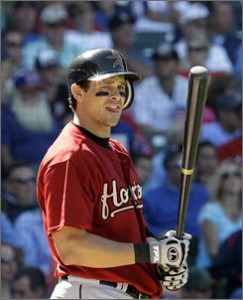
AE: After the surgery you came back to play in the league. You played a bit for the Astros. How good did it feel to be back in the game you love?
AB: Certainly heading in I was at peace if this was the end of my career I was going to be fine with that. That being said once I knew that I had the surgery and that things went well and the rehab process was going well they green lighted me to try and get back.
It was very gratifying. To see your body go through open heart surgery and all of that it entails. To see the weight loss. To really see your body return over a few months period and working hard at the gym to get back and play in the month of September was great. It was my going out party if you will. It was my only year in Houston, but I ended up playing with a lot of people that I am still close with that were so supportive.
It is times like that where you really appreciate friendships and people that are trying to enable you, help you, and support you in realizing your dream in getting back. The fact that I was able to do that was a little bit of closure for me in my career.
AE: What do you think people should know about CHD?
AB: With medicine and technology now, like many diseases in our society you can find out what is going on with your body at early stages of things. It can really help you fulfill your life and get the most out of your life just from early detection.
The fact that I knew about my situation starting in college and I knew about it for 20 years. I did my due diligence of getting my checkups. So doctors were on top of the growth of my heart for when I actually needed to have the surgeries. Maybe 20 to 40 years before that they wouldn’t be able to detect and it would have turned into a heart attack or a stroke. All the advancements and the great technology you can really prevent catastrophic situations by being aware, by getting checked out, by monitoring not only what is going on with your heart, but with your body.
AE: You played for a handful of teams in your career. How was the transition for you when you would start up with another team?
AB: It was a fun part of the game. For me I played my whole minor league career and then my first six, seven years in the big leagues with Cincinnati. When I started bouncing around to different teams I was already a veteran player so I knew a lot of people. I had a lot of relationships throughout the game.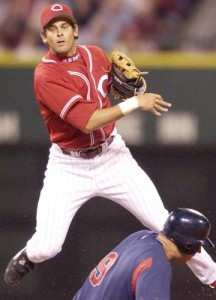
Anytime you would go to another team there was typically several guys that you were familiar with or had friendships with. For me it was always a new challenge, a new chapter of building something with a new team. It was something that I enjoyed to get the opportunity to get to play with several teams at the end of my career.
AE: What is your favorite memory from your playing days? Please don’t say the home run against the Boston Red Sox in 2003. I am a Sox fan and that still hurts. (Both laugh)
AB: Well it was pretty good, but you know 1999 we won 96 games with the Reds. We were a nice mix of young and up and coming players, me, Sean Casey, Pokey Reese, and Mike Cameron early on in our careers with veteran players. There was Barry Larkin, Pete Harnisch, and Greg Vaughan. It was such a really good blend of veteran players, younger players, and it all kind of came together. There were so many special moments that came together that year. Looking back my best year was playing in 1999 with the Reds.
AE: When I watch you on TV I love to hear the passion you have for the game. You do a great job of breaking the game down for the audience. How much fun do you have at ESPN being an analyst?
AB: Well thank you for that. It has been such an awesome way to really be continuing my career. Not being able to play at the highest of levels your body tells you that it is time for that. This is a way to stay involved like you said in a game that I love. It is a sport that I have a lot of passion for. It is a sport where I have a lot of ideas.
The fact that I get to go out there and have a platform to try and bring the game to the viewer from a player’s perspective is what I take a lot of pride in. I enjoy trying to convey the sport that I love in hopefully a simple manner.
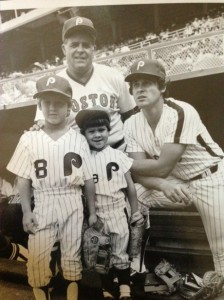 AE: You come from a long line of baseball players. Your grandfather played. Your dad and brother played. First off I think that is amazing for a family to have that type of baseball heritage. What advice did you get from your family as you entered the big leagues?
AE: You come from a long line of baseball players. Your grandfather played. Your dad and brother played. First off I think that is amazing for a family to have that type of baseball heritage. What advice did you get from your family as you entered the big leagues?
AB: My dad played for 19 years in the Major Leagues. He had such a tremendous work ethic that I think hopefully a little bit of that rubbed off on me. He always told me all the time, no matter what I did, do it because you love it and do it to the best of your ability. I always thought that if I could take those two thoughts in whatever path I choose in what I do each and every day that you are going to get a lot out of it. You are probably going to get the most out of your ability.
I always tried to have that simple perspective in even the most trying of times. When you are scuffling at your job or it is not going as smooth as you want, I always tried to get back to that foundation.
Feb 10th

Former Red Sox Kevin Millar tells MANjr what it is like to win the World Series
Kevin Millar had many outstanding moments in his Major League Baseball career. The 2004 season has to rank really high up for him. That year he and the rest of the Boston Red Sox did the unbelievable by beating a 0-3 series deficit against the New York Yankees in the ALCS to move on in the playoffs and eventually win the World Series.
Now retired from the game he loves, Kevin is the co-host of the phenomenal show “Intentional Talk” with Chris Rose on the MLB Network. The show airs weekdays at 5 PM EST. If you have never seen this show you are missing out on some good times. Kevin and Chris talk baseball, but discuss a whole lot more. They even get players from around the league to sing on television. What other shows can do that? Not many!
I had the great pleasure of talking with Kevin about his time in the majors, his show “Intentional Talk,” and winning the World Series.
Art Eddy: I know that you have spoken about this issue at great length, but I have to ask you to put a bow on the Ryan Dempster and Alex Rodriguez fiasco?
Kevin Millar: I think that once everyone has their own opinions, because the bottom line is that what is the right thing to do? Players are upset that A-Rod is playing. They feel that he should be suspended. They feel that he should be serving his suspension. There is an appeal process that Alex has the right to go through, which any other player would go through, and he is appealing this process.
I think the whole bottom line is that we know too much about Alex Rodriguez’s situation. It is public knowledge. For some reason it has been public knowledge and most players that appeal their process we don’t hear about it. There has been a ton of players that have appealed. Melky Cabrera. Miguel Tejada was just playing through an appeal process. Ryan Braun played through his appeal process, but no one knew about it.
Alex Rodriguez, we all knew about it. Players are kind of angry because one now you are judging a guy. The other side of it is the Ryan Dempster situation. The first pitch behind the calf. Did it shock everybody? Sure it did. It wasn’t a dangerous pitch. I do think we blow things out of proportion because it is Alex Rodriguez and the situation. There are players in baseball that get hit every single night. We saw Bryce Harper get drilled in the thigh two weeks ago when he hit a home run off of (Julio) Teheran.
So this happens. It is baseball. I mean my goodness gracious Dempster hits A-Rod. He hits his elbow pad, grazes him in his ribs and it became a huge story. I think everybody is confused. Everyone has got their own opinion. I really don’t know the right situation or the right way. I don’t want to be the Red Sox homer and be anti-A-Rod. That is not what I am about. I am just confused.
This is the first time I think that we have seen this in our sport, ever. It is a lightning rod and Alex Rodriguez should be serving a major suspension and he is going through the appeal process. Players are angry and you are hearing voices. We saw the first action by a Major League player in Ryan Dempster.
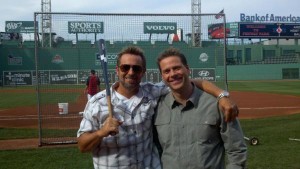 AE: Before we talk about your career in the majors, I want to talk about the show you co-host with Chris Rose called Intentional Talk that launched April 2011 on the MLB Network. It looks like you have blast on that show. You and Chris work great together. How did you get involved to be on the show?
AE: Before we talk about your career in the majors, I want to talk about the show you co-host with Chris Rose called Intentional Talk that launched April 2011 on the MLB Network. It looks like you have blast on that show. You and Chris work great together. How did you get involved to be on the show?
KM: First of all it is a tremendous show. The reason why I say that is if you have one game the Red Sox and Yankees game and you have five different shows, you can only talk about that game so many times. Yankees win 3-1 and (Robinson) Cano hits a three run home run, how many times and spins can you see the Cano home run and that they Yankees won?
It started back then and we love to laugh. I am not a comedian by any means. What you see is what you get, but I am a little goofy. What you see is going to be from my heart. You are going to laugh. It is different. You are going to have relevant videos. You are going to have a player interview every day. We are not going to talk baseball half the time. We are going to ask them a lot of funny questions. Every week we try to get better.
We have a rapid fire segment that is just off the wall questions that players love. It is shocking some of the questions. Two days ago we had J. J. Hardy and one of the questions I asked him was give me the worst thing about Buck Showalter’s face. To see his reaction, he was like ‘What? I can’t say that.’
The show itself is fun. Chris Rose is brilliant. He is very smart. He is very knowledgeable. He is a hard worker. He has helped me a lot. I met Chris through “The Best Damn Sports Show” days when he was working there and I played with the Red Sox. They asked about doing the show. Tony Petitti and John Entz asked, ‘Would you like to do a show?’ I live in Austin and have four kids, I can’t live in Jersey, but they put a camera in my house.
We tried it. It took time. The first three months we were double talking, speaking over each other, but it truly is a fun show. I enjoy doing it. I love doing it. Hopefully everyone who gets a chance to watch it can at least laugh.
AE: What are some of your favorite moments so far on Intentional Talk?
KM: I think when we get players to sing. I mean you are getting Major League players to sing on a microphone. We had Mike Stanton and Michael Morse and it just started. It was like sing us a song, the best line. The next thing you know these are looking in the camera like they are JLO. When you start playing them back, it doesn’t get any better than that. It is great.
Last year at the World Series we had Marco Scutaro on the set and Miguel Cabrera. They start getting into it with each other. Talking about each other’s hair. It is a World Series game and they are getting ready to face each other. This isn’t an All-Star Game. That is what are show is about. Players feel comfortable and you are going to get anybody you want because the trust us. They are not getting the standard baseball question like how do you feel and blah, blah, blah.
AE: Who would be your ultimate guest to have on your show?
KM: I think the biggest running joke has been Derek Jeter. I think Derek Jeter has to come on the show. I want to talk about his hair. How bad his hair is. I want to talk about his cologne. He has never sent me a bottle of his cologne. I want to know who Derek Jeter really is. I think he would probably be a great interview. I don’t think that anybody rags on Derek Jeter publicly. I am going to rag on him. I think it is time for America to know about Derek Jeter.
He has got a lot money. He has got a lot of rings and he is good looking. We know all that. I want to know about some of the girls that he has dated like the rest of the world.
AE: Switching to your playing days as a Red Sox fan I will always remember 2004 season for many reasons. One was your famous rally cry “Cowboy Up.” Take me back and talk about the change of emotions in the clubhouse from Game 3 in the ALCS to Game 4?
KM: In Game 3 we got beat 17-8 or 9 or whatever that score was I was hoping that (Hideki) Matsui and (Gary) Sheffield had blisters on their hands. I think they had four hits and a couple of home runs. I was thinking that maybe their hands were damaged for Game 4. Maybe their blisters are bleeding and they won’t be able to play the next day. At that point we are down 0-3 and we got crushed. There is a long road ahead. You can’t make it up.
You can’t win four straight games against the mighty Yankees. It was a bad time. We showered. As soon as I got up the next day, that night it stays with you, I read the paper. Dan Shaughnessy wrote an article and in there he called us frauds that we all have seen. Then it hit me. I said okay, I didn’t think we were frauds.
I thought that the Yankees were better than us. I got that. You can say that. Sheffield, A-Rod, and Jeter and (Jason) Giambi and Matsui, I get it. They are better, but you can’t call us frauds. I am over there looking at Billy Miller and Trot Nixon and Jason Varitek and Pedro (Martinez), we are not frauds. We are just down 0-3.
That got me a little bit. I got to the field. It was like this little light switch that clicked on. I got to figure this out. When Dan Shaughnessy walked in I wore him out publically in the locker room. I said, ‘Your hair sucks Dan. You got a red perm.’ He had no idea where I was coming from. I am like yea your hair sucks.
He said, ‘Why are you on me?’ Then the whole fraud thing came out. I said don’t let us win tonight and that is how the whole thing started. At that point I think that was our only hope. It was to forget about the three games and let’s move forward and let’s try to win a game tonight. I felt strong with that statement and it is amazing how it all worked out.
AE: Is there one singular moment that stood out to you when you saw the tide turning for you and your teammates?
KM: The part that really turned and I think was the Tony Clark ground rule double. If that ball doesn’t go in the stands we probably lose Game 4 and the series is over. His ball goes into the stands, they can’t score. Now it stays second and third and we win that game. Now you start seeing uh-oh, it was just like one win.
At that point, I don’t care who says who, that pressure is in their dugout. They were a nervous wreck. They knew that this was not looking good. I don’t care who you are, but that was just the way it was. We had nothing to lose. When we left the hotel room going to Yankees Stadium they had no chance. They really had no chance.
They were going to try so hard. There was no ghosts this year. It was the boys of the Sox were going to roll in here and it was just the way it was. It was in the cards. You can’t fight that. We went up there and boat raced them in Game 7. Johnny Damon with two home runs. It was just in the cards. You can’t have a rivalry if you are not going to let us win once. It was about time we won one.
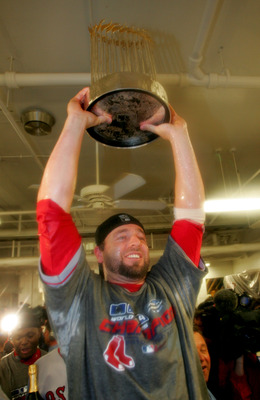 AE: For people like me that will never experience winning a World Series, can you describe what it was like to win a championship?
AE: For people like me that will never experience winning a World Series, can you describe what it was like to win a championship?
KM: It is indescribable, because you are men, you are dads, and you are husbands. You got gray hairs. Some of the guys have bad bodies. They are old, but yet we are kids. You are playing for a ring. You are playing for a World Series Championship. You are playing for a title. You are playing for a city. I am telling you, you can’t describe it.
The Boston Red Sox are number one at that point. 86 years they haven’t won anything. Say what you want with the Cubs. They are the lovable losers. They are cute. They drink beer on day games. I get it. It will be a cool World Series one day, but there is nothing like Red Sox nation at that point. That group of guys, because we were normal. We are bad bodied, normal guys not making $40 million a year.
We are not good looking. We are just normal guys. I think Boston related to us and we were like one big family. We were out. We didn’t have VIP limos dropping us off at the bar. We want a beer, we went across the street on Boylston and go get a beer. You put all that in. It doesn’t make sense, but is was that group, that year, that series, that championship, we were a bunch of kids and it was awesome.
Aug 26th

C.J. Wilson Talks All-Star Game, Angels, and more
C.J. Wilson was in New York City today as he was taking in some of the MLB All-Star Game festivities. He and his team the L.A. Angels are 11 games behind the Oakland A’s in the American League West. He knows that after the All-Star break the Angels need to start playing at a higher level to even get a chance to play in the postseason.
Wilson and I were able to chat about the All-Star Game, his transition from Texas to L.A., and where are some of the toughest places to play.
I was able to chat with C.J. thanks to Head and Shoulders and their “Season of the Whiff” program. For every “whiff” across the league during the 2013 regular season, Head & Shoulders will make a $1 donation to the MLB Reviving Baseball in Inner Cities (RBI) program.
Art Eddy: You are in New York for the All-Star Game festivities. How has it been so for in NYC?
C.J. Wilson: I am doing great. It’s a blistering hot day in New York. I am indoors in the air conditioning. I hope you are too.
AE: I am. I take it the heat in L.A. is a dry heat.
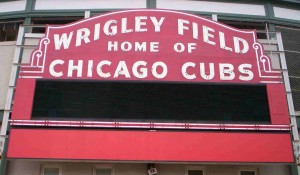 CW: That whole dry heat thing is a sham. You go to Arizona and it is 120 degrees. An oven is a dry heat, but if you stand in there long enough you are going to feel the effects. When we travel to go play in different cities you experience heat in different ways depending on the configuration of the ballpark.
CW: That whole dry heat thing is a sham. You go to Arizona and it is 120 degrees. An oven is a dry heat, but if you stand in there long enough you are going to feel the effects. When we travel to go play in different cities you experience heat in different ways depending on the configuration of the ballpark.
Some ballparks aren’t bad. We were in Chicago the other day. The dugout is so small, in Wrigley Field. The dugout was so small that there was no way to escape the heat. It was really funny. We were all sitting there thinking of ways to cool off. We had no room to wave anything at all without hitting each other in the face.
AE: That is hilarious. This week is All-Star Week and today is the All-Star Game. You played the past two years in that game. What is it like to play in that game?
CW: The All-Star Game is cool, but it is also really weird. It is a bit of a circus and you don’t get the same amount of time to prepare for the game. You don’t get to get a scouting report. You show up to the stadium at 5 o’clock because you are coming back from media availability.
After those interviews it is like okay no go in the bullpen to get ready. You are like who is going to warm me up? They are like there is only one catcher. I ask if there is anyone to throw a long toss with and they say there is no time for that.
It is a little bit different, but it is very exciting too. The game is going to be sold out. You got to see some of these guys up close and get to know them. I didn’t know Robinson Cano was the coolest dude on the planet. Now I know that he is the coolest guy. I just thought he was a guy that smiled a lot and was really good at baseball. That is kind of the fun part for the players.
Players enjoy that kind of stuff. The travel is a little bit hectic. For us we played in Seattle, so (Mike) Trout had to fly a red eye from Seattle to New York. He had to be ready for media availability yesterday morning. Things like that is hectic. It is nice when it is in a place like Kansas City, where everyone is about a 2 hour flight away.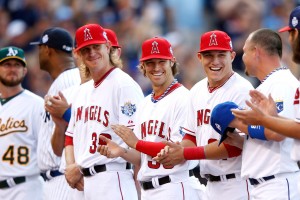
AE: Even though the league that wins that game get home field advantage in the World Series is there less of a competitive vibe in that game?
CW: We are all hyper competitive, which is why we are professional athletes. There are guys who are very competitive and they end up having off the field issues. Like Michael Jordan had the golf gambling thing a few years ago. All professional athletes are hyper competitive or they just don’t stay in the league long enough.
Everyone wants to win and everyone wants to do their best. If you make one mistake than you lose the game and you are the goat. That is what happened to me a couple of years ago. That really sucked. We didn’t score that many runs and I think we lost 3 to 1. The game is always fun. You are always trying to win. You are not necessarily thinking about October, but about how can I pitcher really well. You are always trying to do well whatever they are doing.
AE: You are now in your second year with the Angels. How has this year been different from last year for you?
CW: For me it has been a little bit better in terms of my health and my performance. About this time last year was when my season was going south with my elbow. The changes I have made to my mechanics are going to keep me healthy for the rest of my career.
We are down below 500 which is not very good. We have a lot of potential and a lot of talent, but potential is kind of a four letter word for baseball. We are looking to improve on that. We only have so many games left. We got to start winning.
AE: You kind of hit on something I want to talk about. Do you look at the media and read that you and your team are underachieving or do you just not even pick up the paper?
CW: No, we feel that way. We feel like we should be better. Some think that teams and players are oblivious to that fact. We are not totally oblivious. We are not going to read the papers if we are not doing well. What is the point of reading the papers if you are below 500.
If you are in first place by 15 games, well of course you are going to read the papers since they are talking about how awesome you are. It helps boost your confidence. You just have to control yourself and find the best way to play your best baseball. We have been through some good stretches as well as bad ones. We have to play great baseball every day. Players like myself, Josh Hamilton, Albert Pujols have played on Championship teams. You have to bring your A game every day to win 90 games.
AE: Where is the toughest place to play for you whether it be a hitter’s park or the crowd gets into it?
CW: It goes in waves. Sometimes you will step into a place and you won’t really feel good pitching there. Then all of a sudden you will have a good game. I didn’t used to like playing in Yankee Stadium, but now I do. It goes up and down. I really like pitching in Seattle. I like pitching in Anaheim and Dodgers Stadium.
For whatever reason I don’t do real well in Detroit. It is supposedly a good pitcher’s park. I have given up some weird opposite field home runs there. The dimensions there don’t help me out at all. It is deep in center field, but I don’t give up home runs in center field. If I give up a home run it is straight down the right field line. It is kind of a quirky thing.
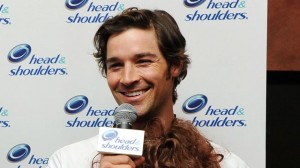 AE: How is it to be a “Mane Man” for Head and Shoulders?
AE: How is it to be a “Mane Man” for Head and Shoulders?
CW: Well the cool thing that is going on for the All-Star Game tonight is that whoever is pitching in the second inning strikes out the side then they win 1 million dollars for their RBI program. Head and Shoulders will donate a million bucks to help kids who normally couldn’t play baseball now can. They are going to get equipment, coaching facilities and all that good stuff. Since this is ‘Season of the Whiff,’ so they are doing a strikeout theme this year at the All-Star Game. For this season Head and Shoulders will donate a dollar for every strikeout for the RBI program.
AE: Tell me about your foundation, the C.J. Wilson Children’s Charity.
CW: In baseball you get opportunities to get out into the community. When I was with the Rangers they encouraged us to get out and help out the community. One of the first things I did was a Christmas event. I met this kid at the Children’s Hospital. We had a moment. We were talking for a bit. I met his dad. I didn’t really think that much of it.
He wrote me a letter and included a picture of me and his son. It was really inspirational letter. He said that I was really good at this and that I should do more of this type of work. I took that personally and hit him up to see if he could help me. He had mentioned that he was on a board for a charity.
Since 2006 we have done a lot of events. We had video game tournaments, bowling events, and stuff with my racecar team. We even did a charity concert at my car dealership. It is really cool to have the charity tie in everything with my off the field interest with my on the field performance for a good cause. We raise money for Children’s Hospital and kid’s camps and things like that.
Jul 16th

C.J. Wilson is a “Mane Man”
Head & Shoulders has just made Los Angeles Angels of Anaheim pitcher C.J. Wilson a “Mane Man.” The two are challenging guys to take a whiff of what a double dose of confidence smells like through the launch of new Head & Shoulders with Old Spice, which is the official shampoo of Major League Baseball.
Marking the brand’s third year of partnership with MLB, Head & Shoulders has boldly declared it’s the “Season of the Whiff” and their money is on pitchers, literally. For every “whiff” across the league during the 2013 regular season, Head & Shoulders will make a $1 donation to the MLB Reviving Baseball in Inner Cities (RBI) program. 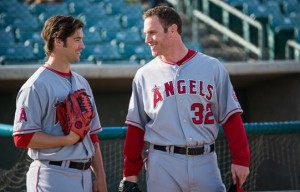
This is where you come into play! Fans can get involved by tweeting whiffs throughout the season via the #Whiff hashtag along with their favorite team’s Twitter handle to rack up the donations for their teams’ local RBI leagues and also have the chance to win cool MLB prizes.
The RBI program is the MLB youth initiative designed to give young people from urban and underserved communities the opportunity to play baseball and softball, encourages academic success and achievement, and teaches important life lessons and values. So you get to talk smack about other teams as your favorite team’s pitchers has batters looking silly.
On working with Head & Shoulders Wilson said, “I’m excited to be working with Head & Shoulders this season promoting the ‘Season of the Whiff.’ My job is to strike people out, that’s why the Angels brought me in. So if any hitters out there want to help the kids, just go ahead and strike out.”
For more info on this great promotion check out the Head & Shoulders for Men Facebook page.
Jun 3rd

